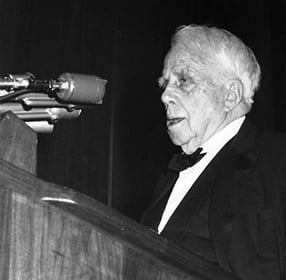In a Disused Graveyard
The living come with grassy tread
To read the gravestones on the hill;
The graveyard draws the living still,
But never any more the dead.
The verses in it say and say:
“The ones who living come today
To read the stones and go away
Tomorrow dead will come to stay.”
So sure of death the marbles rhyme,
Yet can’t help marking all the time
How no one dead will seem to come.
What is it men are shrinking from?
It would be easy to be clever
And tell the stones: Men hate to die
And have stopped dying now forever.
I think they would believe the lie.
This poem is in the public domain. Published in Poem-a-Day on October 28, 2023, by the Academy of American Poets.
“In a Disused Graveyard” appears in Robert Frost’s collection New Hampshire (Henry Holt & Company, 1923). In “Robert Frost, Humorist,” published in The Robert Frost Review, no. 1 (Fall, 1991), Sandra L. Katz, professor emerita of English at the University of Hartford, writes, “The speaker decides to tell the stones that the reasons why the graveyard is ‘disused’ is that ‘Men hate to die / And have stopped dying now forever.’ The persona is playing a joke on the stone, but one that we—perhaps foolishly—wish were true.” Similarly, in “Technique and the Sense of Play in the Poetry of Robert Frost,” published in Frost: Centennial Essays II (University Press of Mississippi, 1976), Walton Beacham, director of creative writing at Virginia Commonwealth University, notes the poem’s “lighthearted spookiness which, like a haunted mansion, makes us only ostensibly afraid [. . .]. In ‘In a Disused Graveyard’ there is a certain playfulness, and its meter and personification make it somewhat ironic, but not to the extent it might have been had the middle stanzas not weakened [the ironic effect].”

